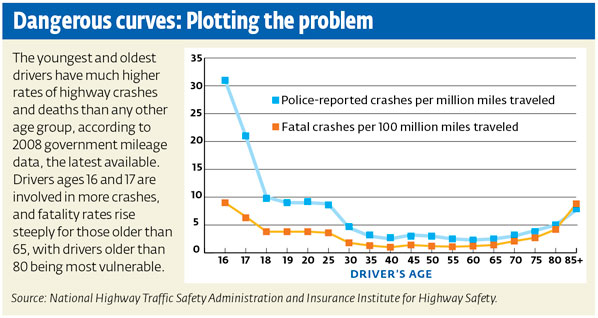When you’re a senior care provider, you find that people often ask your opinion about decisions they must make in their own parents’ care. One of the questions adult children ask us a lot here at Marjorie P. Lee: “When should elderly parents stop driving?”
If that’s the question you’ve been asking, you’re not alone. It’s a tough conversation to have with an aging parent, fraught with nuances and pitfalls. In fact, it’s the conversation that adult children most often report having extreme difficulty approaching.
A stressful situation all around
Parents who are asked to relinquish control of the keys might express resentment at losing their independence. They become indignant. They may feel powerless — even depressed or ashamed — because they’re unable to take care of themselves the way they used to, and fear becoming a burden on their children.
On the other hand, adult children usually find it stressful to realize that the person to whom they’ve looked to for support, advice and structure their entire lives, is no longer able to be safely independent. Adult children worry not only about their parents’ safety on the road, but about that of other drivers, because they would feel responsible for them, too, should an accident occur.
Note the regular appearance of new dings, scuffs or scratch marks on the car — and if your parent can’t quite remember how they got there.
And, although it’s certainly not an unwanted burden, and most take on the role willingly, arranging transportation for older parents is an additional set of responsibilities for an adult child to juggle. They must build in time to drive them to the grocery, take them on errands, to make sure they get to doctors’ appointments and to the pharmacy on time.
They pick their elderly parents up to bring them to family events, then take them back home afterwards. They’re on 24/7 call, in case of an emergency. No, it’s not an easy situation at all.
We always caution seniors and their adult children to remember to approach the question of when to stop driving from a rational, dispassionate standpoint.
So, here are five objective criteria you and your elderly parents can use to decide when it’s the right time to give up the keys.
1. A series of minor accidents or close calls
A fender-bender or a near-miss can happen to anybody. But a series of them is exceedingly unlikely, and may indicate that your senior parent’s reaction time isn’t what it used to be.
Likewise, if you or your parent is noticing the regular appearance of new dings, scuffs or scratch marks on the car, and your parent can’t quite remember how they got there, you should be asking yourselves if it’s possible he or she is getting confused or disoriented while driving.
Major accidents — or minor accidents caused by missing stop signs, misjudging distances, sideswiping other vehicles, or confusing the brake and gas pedals — are glaring warning signs that a senior is unsafe behind the wheel.

2. Being pulled over several times in a year
Most of us get pulled over every once in awhile. But if your senior parent has been stopped, warned and/or ticketed several times in the past 12 months — especially for reasons like straying over the center line, failure to signal, improper turns, or failure to maintain the minimum speed — it may indicate he or she is having difficulty behind the wheel.
3. Difficulty seeing when driving at night or difficulty reading road signs
Many seniors with degenerative eye changes report seeing headlight “auras,” which easily blind them, when they encounter oncoming traffic at night. This can create extremely dangerous situations for your parent, for any passengers in the car, and for nearby drivers alike.
Likewise, if you notice your parent has trouble reading road signs or traffic signals, daytime or night, it may indicate he or she is losing visual acuity or exhibiting slowed reaction times.
4. Pain when turning to check the rearview or glancing at side mirrors
For some seniors, reaction times and eyesight aren’t the problems inasmuch as chronic pain or arthritis are. If it’s uncomfortable for your parents to turn around and look out the rear windshield while backing up, or they have difficulty turning to check mirrors and accompanying traffic, an accident becomes more likely.
5. Often arriving late or getting lost.
Parents who repeatedly have difficulty remembering how to get to destinations — especially if those destinations are relatively familiar — may be experiencing age-related memory loss or the early stages of dementia.
If your parents consistently arrive late and/or often report getting “turned around” on the way, it may be a sign that memory or concentration isn’t quite what it used to be.
Strategies, if your parent is still resistant.
If your parent is clearly unsafe behind the wheel but is unwilling to entertain the notion of relinquishing the wheel, you have several options.
Many states allow adult children or family caretakers to request a senior relative be retested, if they suspect that driver to be unsafe behind the wheel. And some states automatically require retesting when drivers over a certain age are ticketed. And there is always the possibility of petitioning the court to revoke a parent’s license.
But before it comes to such, try “having the talk,” respectfully, avoiding confrontation. AARP, in cooperation with insurer The Hartford and MIT’s AgeLab, developed this helpful online seminar that could help you and your parent figure out when the time is right to stop driving.
When that time comes, remember that many Cincinnati seniors preserve their independence by moving to retirement communities like Marjorie P. Lee.
We work closely with seniors and their family caregivers to make sure that any needs for transportation to off-site medical appointments are met. And we offer our residents regular transportation to grocery stores and pharmacies, shopping districts, entertainment and events. Don’t hesitate to reach out to find out how we can help your elderly parents live well into the future.













